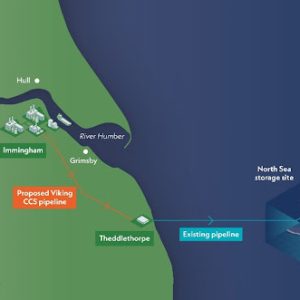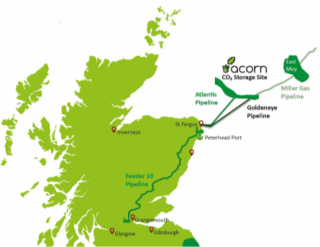-
Viking and Acorn carbon storage projects selected in the UK, bringing the total to four CCUS clusters
Date posted:
-
-
-
Post Author
Greg Kelsall
-
-

The UK Government has announced that the Viking and Acorn CO2 transportation and storage (T&S) networks have been selected as Track-2 projects in the UK’s Cluster sequencing process. The Track-2 T&S networks aim to establish 2 further CCUS clusters, contributing to the ambition to capture and store 20-30 MtCO2/y across the UK economy by 2030. These T&S networks are additional to the East Coast Cluster and HyNet T&S networks already announced under Track-1, bringing the total to four clusters.
The Government had already indicated that it believed the Acorn and Viking T&S systems were best placed to deliver Track-2 objectives. However, it still launched an expression of interest (EOI) process to test that view earlier this year. Following a review of the EOI applications against the Track-2 eligibility criteria, it was concluded that at this stage, Acorn and Viking T&S systems remain best placed to deliver the Track-2 objectives, subject to final decisions, due diligence, consenting, subsidy control, affordability and value for money assessments.
Harbour Energy takes a leading role in both the Track-2 projects, being operator of the Humber-based Viking project and a partner in the Acorn project in northeast Scotland. A brief overview of the two T&S networks is given below:
Viking- has the potential to transport and store up to 10 mtCO2/y by 2030 and 15 mtCO2/y by 2035 with independently verified storage capacity of 300 million tonnes of CO2. It includes a 55km pipeline that will transport the CO2 from Immingham to the former Theddlethorpe Gas Terminal. From here, it will join an existing offshore pipeline to the Viking area in the UK southern North Sea, where the carbon dioxide will be injected into depleted gas reservoirs 2.7km beneath the seabed. According to Harbour Energy, the project could be transformational for the Humber region, potentially unlocking up to £7 billion of investment across the full CO2 capture, transport and storage value chain between 2025 and 2035, creating over 10,000 jobs during construction and providing an estimated £4 billion of gross value add to the Humber and its surrounding areas.
The Viking CCS project together with Associated British Ports at the Port of Immingham can also enable the potential for shipped CO2 from dispersed emitters elsewhere in the UK and internationally to be transported for permanent storage within the Viking fields.
Acorn- Acorn is a joint venture, benefiting from the collective expertise of Storegga, Shell UK, Harbour Energy and North Sea Midstream Partners. Acorn CCS is a CO2 T&S system which reuses legacy oil and gas infrastructure to transport captured industrial CO2 emissions from the Scottish Cluster, to permanent storage 2.5km (1.5miles) under the North Sea. The Scottish Cluster is a collection of industrial, power and hydrogen businesses in the Central Belt and North-East Scotland which rely on Acorn CCS to decarbonise their operations. Acorn CCS could also provide a solution for industrial emitters who do not have immediate access to storage. There is potential to use non-pipeline transportation, like shipping, to move captured CO2 from across the UK and internationally to the Acorn CCS geological storage sites.
On the announcement of the Track-2 award, Dr Nick Cooper, CEO of Acorn lead developer Storegga, said: “We are thrilled that the Acorn Project has advanced directly into Track-2. Acorn has been progressed by the development partners as the Track-1 reserve since late 2021, and is ready to move promptly to support the decarbonisation of Scotland and the wider UK”.
![]()
One of the next steps for both projects will be to set out the process by which capture projects for Track-2 will be selected to meet the stated ambitions. And of course there is the promised extension to the Track-1 cluster emitter projects announced earlier this year as reported previously by IFRF.

